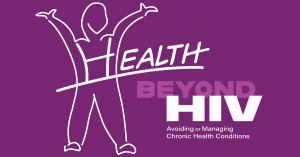Springfield, Illinois – Sept. 12, 2023 – Illinois HIV Care Connect today introduces its Health Beyond HIV Campaign. Through website and social media content, the campaign will feature information that can help persons living with HIV to avoid or manage chronic medical conditions, known as co-morbidities.
According to the National Institutes of Health, persons living with HIV are at elevated risk for developing chronic health conditions such as cardiovascular disease, cancer, diabetes mellitus, and chronic kidney disease. These individuals are also at elevated risk for developing coinfections such as hepatitis B, hepatitis C, and tuberculosis.
However, persons living with HIV can reduce risks associated with these co-morbidities by receiving antiretroviral therapy, or ART, exactly as prescribed to suppress HIV to undetectable levels in the blood. Other ways to reduce these risks include receiving recommended health screenings, preventive care and vaccinations and by following healthy diet and exercise regimens. Lowering these risks increases a person’s chances of living a long and healthy life.
Recommended preventive care includes monitoring blood pressure and blood lipids, cancer screenings according to age guidelines (colon and oral cancer screenings for women and men, testicular and prostate for men, and breast and cervical for women), and testing for hepatitis B and C and tuberculosis. In addition, tending to mental health helps to manage stress and conditions such as depression and anxiety.
Vaccination recommendations include getting a flu shot every year – it can provide safe and effective immunity throughout the flu season. The Centers for Disease Control and Prevention (CDC) recommends that persons living with HIV stay up to date with COVID vaccines for their age group, regardless of their CD4 count or viral load. CDC also recommends that anyone with HIV get vaccinated against mpox (monkeypox). Other commonly recommended vaccines include ones for hepatitis A and B, meningitis, human papillomavirus (HPV), shingles and pneumonia.
As for diet and exercise, persons living with HIV can reduce the risk of contracting diabetes or cardiovascular disease by reducing their consumption of foods containing refined sugar, carbohydrates, and sodium – highly prevalent in processed foods – and by regularly engaging in physical activity.
“Getting and staying in regular health care can be a challenge for anyone, but it’s especially important for persons living with HIV,” said Michael Maginn, HIV prevention director, Illinois Public Health Association, which manages Illinois HIV Care Connect with funding from the Illinois Department of Public Health. “A care provider who understands HIV can help you to stay on track with recommended screenings and vaccinations and provide regular encouragement to keep up with a healthy diet and exercise.”
The #HealthBeyondHIV Campaign will be visible on Illinois HIV Care Connect’s Twitter, Facebook, Instagram and Threads social media platforms. A Health Beyond HIV Quiz offers an easy way to understand how to reduce risks associated with HIV.
The Health Beyond HIV Campaign is Illinois HIV Care Connect’s 10th annual quality improvement initiative, following programs on HIV and aging, HIV innovation in Illinois, HIV stigma, HIV and youth, social determinants of health, HIV treatment as prevention, viral suppression, staying in HIV care, and HIV and mental health.
About Illinois HIV Care Connect
Illinois HIV Care Connect is a statewide network providing medical case management, health care and support services to persons living with HIV. Illinois HIV Care Connect’s eight lead agency offices serve persons living with HIV in all of Illinois’ 102 counties. https://hivcareconnect.com
Media contact: Ray Valek, ray@valekco.com, 708-352-8695


